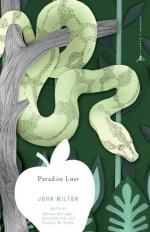|
This section contains 5,772 words (approx. 20 pages at 300 words per page) |

|
SOURCE: “Structural Pattern in Paradise Lost,” in Milton: Modern Essays in Criticism, edited by Arthur E. Barker, Oxford University Press, 1965, pp. 142-55.
In the following essay, originally published in Philological Quarterly in 1949, Barker discusses how in Paradise Lost Milton moved away from a Virgilian ten-book, five-act structure to a twelve-book form that ultimately serves to reduce Satan's power over the poem.
Milton, as Professor Thompson has said, “realized that form is determined not by rule or precedent but by the thought to be expressed. Hence he adapted the pattern of the epic to his own ends, and wrote as a creative artist.”1
From its opening invocation Paradise Lost invites attention to this process of adaptation and transcendence. The initial statement of the threefold subject (disobedience and woe, till restoration) immediately suggests specific comparison with the opening statement of the Aeneid (Troy fall and wandering, till the new city...
|
This section contains 5,772 words (approx. 20 pages at 300 words per page) |

|


